IDrive vs Backblaze
In this IDrive vs Backblaze head-to-head, we compare two popular cloud storage solutions to help you decide which one is best
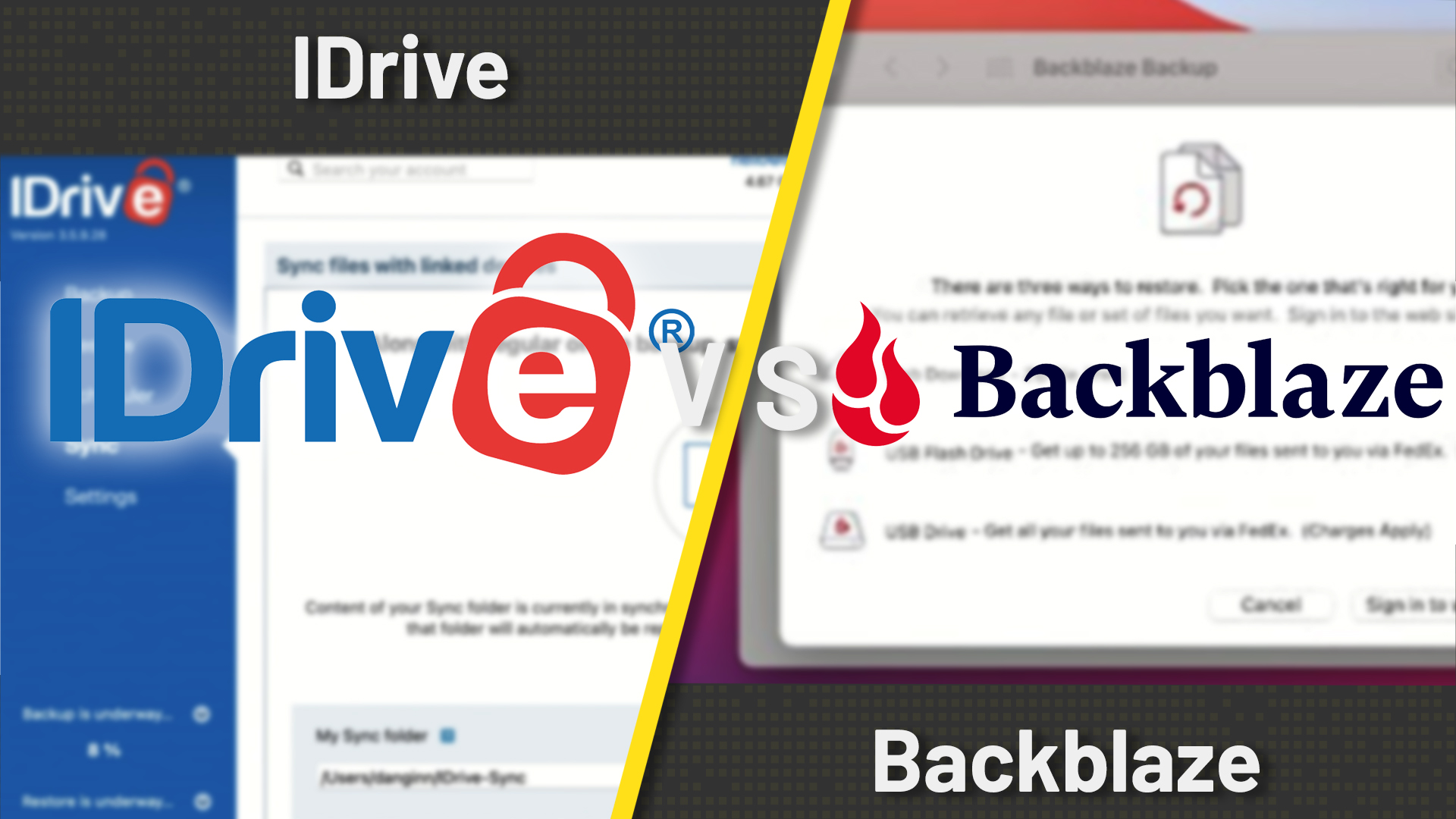

The importance of backing up your files and data is constantly increasing in our ever-growing digital world. Early adopters of online cloud storage will remember the days when options were scarce. That's not the case today, with more companies than ever competing to be the best cloud storage service.
Two popular cloud platforms, IDrive and Backblaze, tend to lead the way when it comes to offering reliable cloud backup solutions for your files and data. Neither may be mainstream, but they offer more than many of the household names, especially when it comes to security and privacy.
Because both services are go-to options, choosing which one to use may feel difficult. To help, we're going to break down and compare many of each service’s core features. From price to performance (and everything in between), we will identify a clear winner in this IDrive vs Backblaze head-to-head.
- IDrive: get the best cloud storage for only £3.27
IDrive delivers tonnes of storage for reasonable prices, supports unlimited devices, and provides extensive file versioning as well as a series of other top tools that make it the best cloud storage provider. For a limited time, you can get 10TB of cloud storage for only £3.27 for the first year! - Get Backblaze for free with every ExpressVPN purchase
ExpressVPN is offering free unlimited cloud backup courtesy of Backblaze for a whole year with its annual subscription. Secure, business-grade online backup for everyone, no strings attached.
IDrive vs Backblaze: Features
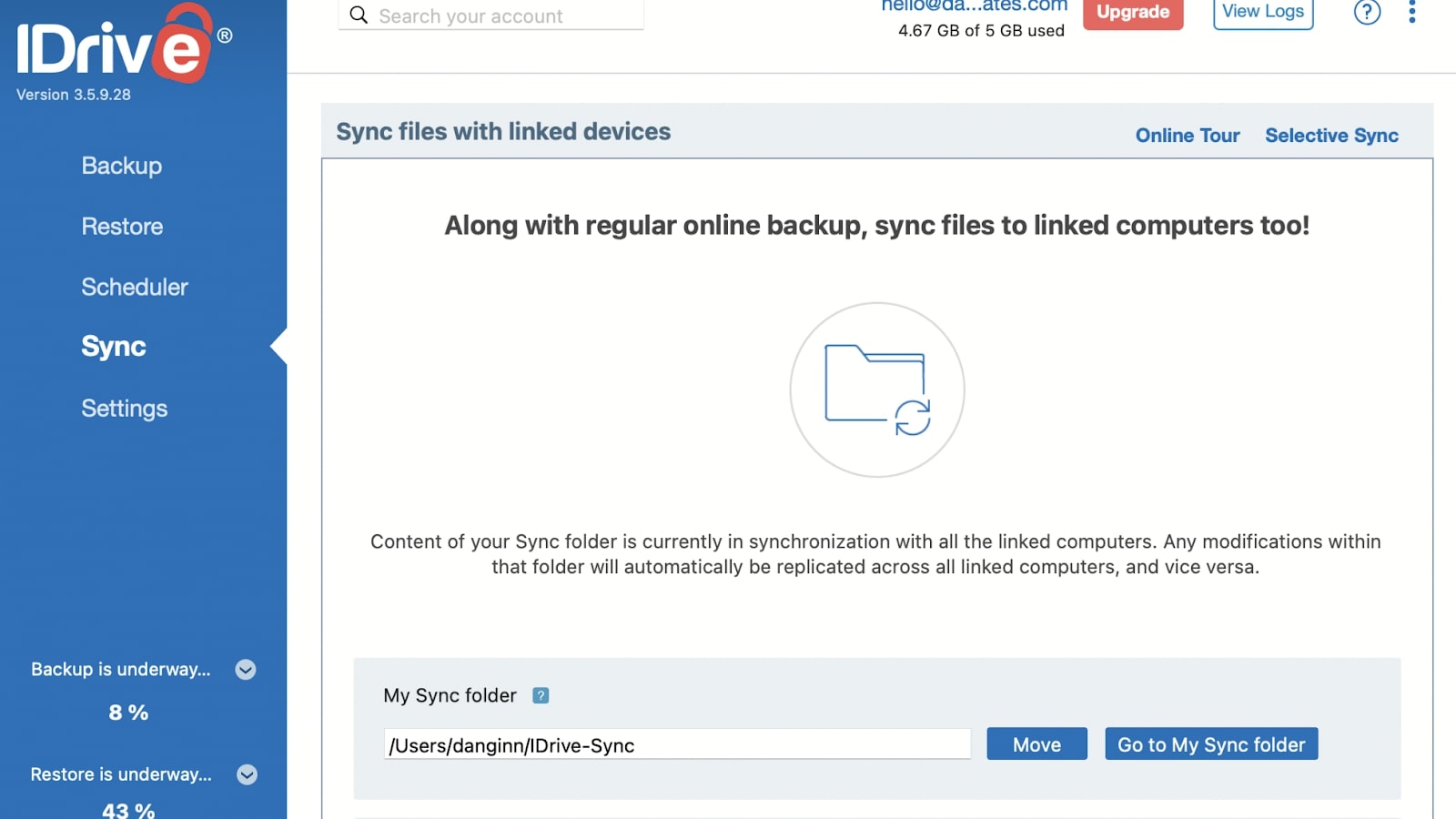
Both IDrive and Backblaze come with features that will appeal to different audiences. Ultimately, they both offer online backup for your files, but the way they do it isn't the same. IDrive has opted for a more feature-heavy approach to its services, whereas Backblaze favors simplicity, offering a more streamlined user experience for ease of use.
With IDrive, users can enjoy a range of backup types that Backblaze doesn't offer. The former allows you to make image-based cloud data backups (IDrive clones your hard drive, giving you a complete recovery option in the future). You can also back up your servers and create a hybrid backup through the cloud and an external hard drive. At the request of its users, IDrive also sends out a physical hard drive to perform local backups.
Although Backblaze lacks some key backup features, it does offer something different when it comes to recovering your files. Users have the option of mailed recovery, which means Backblaze will post out a USB drive containing your backup should your current machine malfunction. The amount of time it takes to recover an online backup is extremely short too, something we will go into in more detail shortly.
File synchronization is available across multiple devices for IDrive users. Uploading and downloading files wasn't difficult, nor was sharing a file with an authorised third party.
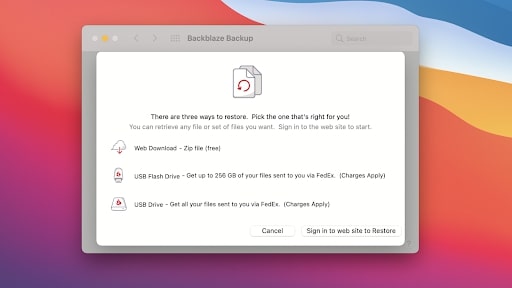
For a more mainstream cloud experience, Backblaze does offer what it calls B2. This feature allows users to upload specific files to the cloud, such as photos and videos. You can only use B2 through the web-based app, resulting in a less fluid and synchronised user experience.
Both services offer file versioning, which allows you to recover deleted files or older versions of modified backups. Backblaze, however, only offers file versioning on backups for up to 30 days (users can pay an extra £1.64 a month for extended file versioning). IDrive, on the other hand, allows users to recover deleted or modified backups indefinitely across all its plans for no extra cost.
IDrive and Backblaze are compatible with both Mac and PC, and IDrive also works on Linux-based systems. They both have a mobile app. However, Backblaze only allows users to download their files with the app, while IDrive offers more functionality because of its ability to upload and sync data from a mobile device.
Regarding security, both services have measures in place to ensure your data remains safe. They both have AES 256-bit encryption for your files once they've reached their servers, and offer a secure SSL connection when transferring data to the server. 2FA is available for both services, making it harder for third-party access, should your password get into the wrong hands.
IDrive is a zero-knowledge provider, which means only you, the user, can access your information and opt for the service provider to be excluded from access. This plus the other security elements mean it ranks highly among our lists of the best secure cloud storage and the best encrypted cloud storage.
Sadly, Backblaze doesn't offer the same level of privacy and security. For the average user, this shouldn't be a deal-breaker. But for those that need peace of mind that their files have the most stringent security protecting them, IDrive leads the way for overall privacy features.
IDrive vs Backblaze: Performance
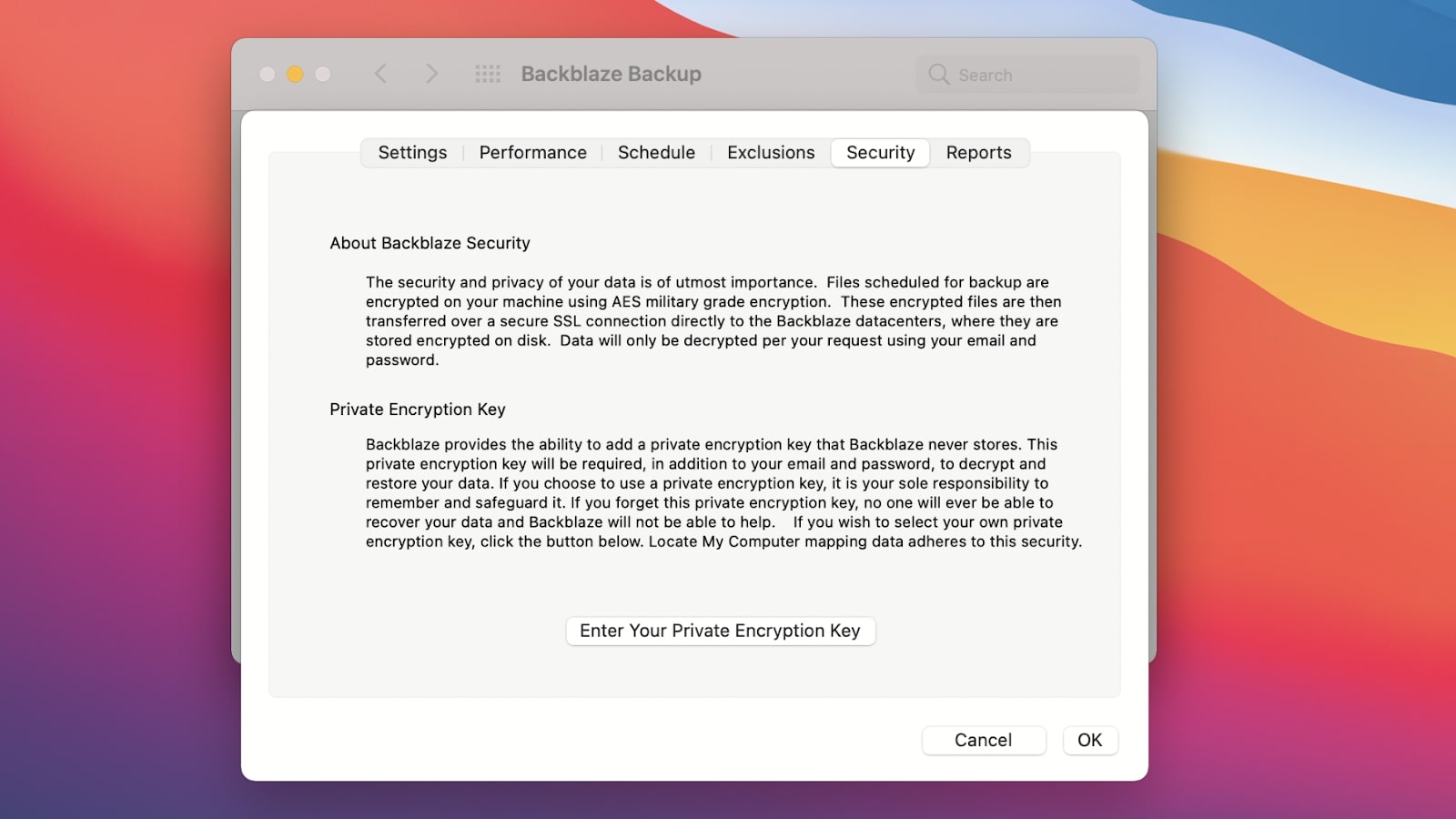
Performance-wise, there are a few key factors we're going to consider, and usability is our first port of call.
Backblaze's user interface is extremely minimal, coinciding with its feature-thin service. The advantage of that is that using the desktop app feels smooth and straightforward. It's easy to navigate through the multiple tabs inside the app, and due to the simplistic layout, it's also easy to understand what each tab allows the user to do.
IDrive offers a similar user experience, again offering a clean layout with its desktop app. As with Backblaze, IDrive clearly divides its services into sections, making it simple to navigate between each function.
Both services give you control over when and how often you back up your data. Although both have the option of daily backups, IDrive also offers weekly backups of your files.
When restoring your files, the approach between the two is slightly different. IDrive users can restore their data directly through the desktop app. On the contrary, Backblaze users have to go through the web-based application to restore their information (or pay £155.13 to be sent the aforementioned hard drive containing their data).
Time is of the essence in our vastly growing digital world. So we tested both online backup solutions to see how fast they can back up and restore data, using an internet connection that has 100Mbps download speeds and 15Mbps upload speeds.
We backed up 7.2GB of data (including photos, documents, music, and video) on each server. When using IDrive, it took one hour and 43 minutes to complete the upload. Performing even better, Backblaze took only 53 minutes to complete the upload.
Backblaze also won the race when it came to restoring the files, taking just shy of 11 minutes to fully restore them. IDrive wasn't too far behind, taking around 16 minutes to complete a full restore. Speeds will, of course, differ depending on your internet speed.
IDrive vs Backblaze: Support
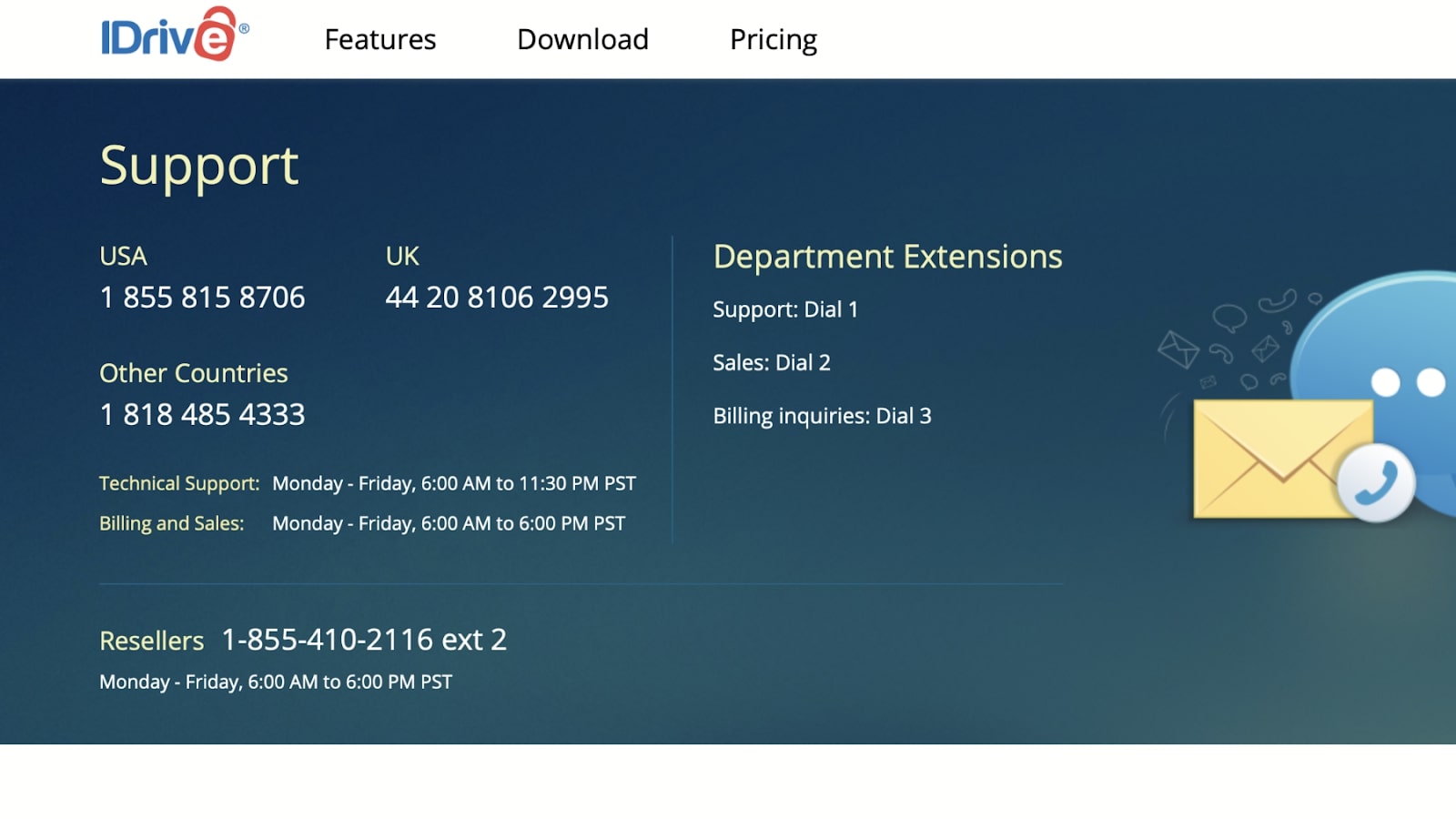
IDrive offers fantastic customer support. Users can either call, email, or use live chat when they need assistance. There's a contact number for calls made both inside and outside the United States. The technical support team is available Monday to Friday, from 6:00am to 11:30pm PST.
When testing the live chat, a team member attended to us immediately, with no wait time whatsoever. We tried it again to see if we were lucky, and the support team repeated the same level of immediacy. Live chat is available 24/7, which is also a nice feature.
When it comes to Backblaze's customer support though, it's a little underwhelming. Our first issue is the lack of direct telephone support, meaning users will have to make do with online support only. Backblaze does have live chat support. However, it's only available between 9am and 5pm PST, and is closed every other Wednesday.
When testing the live chat, we only waited one minute before being connected to a team member. Email support is also available for those who can wait. We sent an email to Backblaze’s support team, and received a response to our query within six hours.
For something as sensitive and important as your files and data, having an easily accessible and efficient support team is essential. We can't fault IDrive for what it offers. However, Backblaze has some catching up to do if it wants to appeal to more users.
IDrive vs Backblaze: Pricing and plans
For pricing, both services offer good value for money. In terms of options, IDrive has nine different plans available, whereas Backblaze has gone for a one-size-fits-all approach, offering just one backup plan. Users can pay for the available plans on a monthly, yearly, or two-yearly basis.
For personal use, three plans are available with IDrive: Basic, Personal 5TB (£65.25 a year), or Personal 10TB (£81.67 a year). The free plan offers 5GB of storage, which will be fine for those looking to back up a minimal number of files. Heavy users and those looking to make full system backups will need to turn to the paid plans that offer more storage space.
IDrive is currently offering the 10TB plan for a hugely discounted price of £3.27 for the first year — this is, for our money, the most affordable high-capacity cloud storage plan available. You need to prove you're using a competitor as part of the signup, though. All personal plans are only available to one user; for multiple users on one plan, you'll have to select a plan from the business options.
For business use, IDrive offers a more incremental approach to its plans across its Team and Business models. Team plans cover from five to 35 users and computers, while Business plans cover unlimited users and devices. The Team plans range from 5TB at £81.67 a year up to 35TB at £574.15 a year. The most affordable Business plan provides 250GB (for $81.67 a year). At the other end, for 12.5TB, users must pay £2,461.99 a year. Thankfully there are four other options in between, making IDrive appealing to a wider range of users. It's worth regularly checking IDrive's website, as it's usually offering large discounts off these prices.
Backblaze's one plan for all asks users to pay £4.92 a month or £49.25 a year. No matter what subscription fee you choose, you will gain access to an unlimited amount of storage space—£4.92 a month for unlimited storage is outstanding value, especially if you're a single user.
It's important to note that, unlike IDrive, Backblaze doesn't have the option to add multiple users to one account. If you're a business user, you'll need to purchase multiple accounts for multiple users, which is far from ideal. There's no free option available with Backblaze either. However, you do have access to a free 15-day trial before deciding to pay for a subscription.
Because of the diversity of its plans, IDrive is the better option for business users. Also, having the ability to add multiple users to one account shouldn't be overlooked. It will make user management far more fluid and straightforward, especially compared to Backblaze’s limited one-user per account model.
But for the individual user whose primary concern is cost, Backblaze is the way to go. Not many other services can compete with that level of value, more so when offering unlimited storage space.
You can also take advantage of a deal between Backblaze and ExpressVPN, whereby you can get Backblaze for free for a whole year when you sign up to ExpressVPN.
IDrive vs Backblaze: Verdict
We can see why both IDrive and Backblaze are attractive options for those looking for a reliable online backup solution. They're both easy to use, come with features that set them apart from the mainstream, and offer superb value.
When it comes to our head-to-head, IDrive is our clear winner for all types of users. Its range of plans means there's something for everyone, and the number of backup options means no stone is left unturned when protecting your data.
While Backblaze offers a streamlined service, it's at the expense of features we would much prefer to have. Not only does it fall short when it comes to backup options, but it also lets itself down by not offering the same robust level of security and privacy as its competition.
So, if you're looking for a service that ticks plenty of boxes—and ticks them well—overall, IDrive is the best path to take for both the personal and business user.
Further reading on cloud storage
Read some of our other cloud storage comparisons between leading providers, including: OneDrive vs Azure; Google Drive vs OneDrive; IDrive vs OneDrive; Google Drive vs Dropbox; OneDrive vs Dropbox; and pCloud vs Dropbox.
Get the ITPro daily newsletter
Sign up today and you will receive a free copy of our Future Focus 2025 report - the leading guidance on AI, cybersecurity and other IT challenges as per 700+ senior executives
Daniel is a freelance writer and journalist, specializing in technology, photography, and lifestyle topics. You can see his words and thoughts in publications such as iNews, TechRadar, and Tom's Guide.
-
 Cleo attack victim list grows as Hertz confirms customer data stolen
Cleo attack victim list grows as Hertz confirms customer data stolenNews Hertz has confirmed it suffered a data breach as a result of the Cleo zero-day vulnerability in late 2024, with the car rental giant warning that customer data was stolen.
By Ross Kelly
-
 Lateral moves in tech: Why leaders should support employee mobility
Lateral moves in tech: Why leaders should support employee mobilityIn-depth Encouraging staff to switch roles can have long-term benefits for skills in the tech sector
By Keri Allan